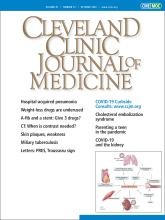ABSTRACT
COVID-19 is primarily considered a respiratory illness, but the kidney may be one of the targets of SARS-CoV-2 infection, since the virus enters cells through the angiotensin-converting enzyme 2 receptor, which is found in abundance in the kidney. Information on kidney involvement in COVID-19 is limited but is evolving rapidly. This article discusses the pathogenesis of acute kidney injury (AKI) in COVID-19, its optimal management, and the impact of COVID-19 on patients with chronic kidney disease, patients with end-stage kidney disease on dialysis, and kidney transplant recipients.
- Copyright © 2020 The Cleveland Clinic Foundation. All Rights Reserved.
- Mohamed Hassanein, MD
- John Sedor, MD
- Tushar Vachharajani, MD
- Vidula T. Vachharajani, MD
- Joshua Augustine, MD
- Sevag Demirjian, MD
- George Thomas, MD⇑
- Department of Nephrology and Hypertension, Glickman Urological and Kidney Institute, Cleveland Clinic; Assistant Professor, Cleveland Clinic Lerner College of Medicine of Case Western Reserve University, Cleveland, OH
- Address:
George Thomas, MD, Department of Nephrology and Hypertension, Q7, Cleveland Clinic, 9500 Euclid Avenue, Cleveland, OH 44195; thomasg3{at}ccf.org
ABSTRACT
COVID-19 is primarily considered a respiratory illness, but the kidney may be one of the targets of SARS-CoV-2 infection, since the virus enters cells through the angiotensin-converting enzyme 2 receptor, which is found in abundance in the kidney. Information on kidney involvement in COVID-19 is limited but is evolving rapidly. This article discusses the pathogenesis of acute kidney injury (AKI) in COVID-19, its optimal management, and the impact of COVID-19 on patients with chronic kidney disease, patients with end-stage kidney disease on dialysis, and kidney transplant recipients.
- Copyright © 2020 The Cleveland Clinic Foundation. All Rights Reserved.






